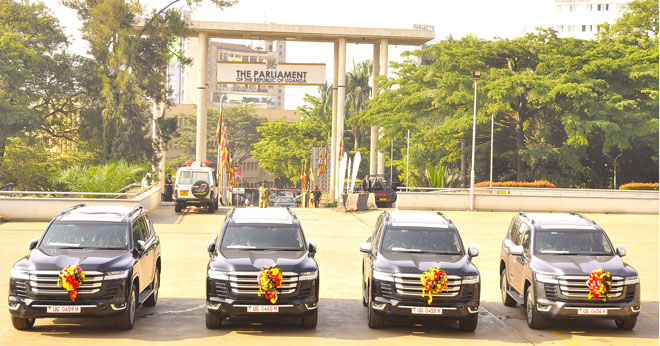
Kampala, Uganda | THE INDEPENDENT | On Monday, a section of the public took to social media to decry what they called unnecessary government expenditure after watching videos and pictures of the Speaker of Parliament Anita Annet Among handing overt luxurious vehicles to four former speakers of parliament.
Those who received new cars were Edward Rugumayo who was speaker of the National Consultative Council which acted as parliament between 1979-1980, Francis Butagira who was speaker between 1980 and 1985, Moses Kigongo who was speaker of the National Resistance Council between 1986-1993 and Edward Kiwanuka Ssekandi who was Deputy Speaker between 1996-2001 and Speaker between 2001-2011.
Among those who criticized government priorities to gift former leaders was Robert Kyagulanyi Ssentamu of the National Unity Platform, the biggest opposition political party.
Taking to X, Kyagulanyi said a country that is struggling to feed its citizens, cannot afford to buy such luxurious vehicles for former leaders who are already well-off. Each of the five vehicles that were publicly given out, cost the taxpayer Shs 600 million.
“Where is the common sense Museveni was talking about recently? The regime claims to be cash-strapped. Citizens are dying of hunger in different parts of the country. The regime can barely offer any meaningful services to the people. And what do they do? Spend billions to purchase luxury cars for former Speakers of Parliament, some of whom still hold well-paying government jobs where they already have vehicles and convoys following them around,” Kyagulanyi wrote on his X page.
In justifying the giveaway, Speaker Among also X said that she was simply following the dictates of the law first written in 2007 and amended in 2022 to include former speakers from 1980 to 2007 when the law came into effect.
“For avoidance of doubt, the Parliamentary Pensions Act as amended, now entitles them to both monetary and non-monetary benefits as provided for in the Parliamentary Pensions Act, 2022. The Parliamentary Commission is also extending the same benefits but only in monetary terms to the spouses and dependents of former Speakers and Deputy Speakers who either died in office or retired. I know that all of you, the living retired Speakers and Deputy Speakers are already getting your monetary benefits from the Parliamentary Commission. What was missing was the provision of a four-wheel chauffeur car which the Parliamentary Commission has now procured,” Among said on X.
She added that these cars will remain the property of the government and that the Parliamentary Commission will be responsible for their maintenance and payment of allowances to their drivers who will be enrolled on the pay list as employees of the Parliamentary Commission. She added that the vehicles will be replaced every five years in accordance with the government transport policy.
Although this is a 2007 law, the outrage on social media suggested that many had not heard about it.
Perhaps, it’s because of the public handing over of these vehicles; the first of its kind, that awoke the people to what they called unnecessary expenditure. According to the law, a retired Speaker is entitled to a monthly allowance equivalent to 60 percent of the monthly salary of a sitting Speaker, a four-wheel chauffeur-driven car with a cubic capacity of 3500 to 4000 that is replaced every five years, two security guards, two domestic staff, medical care for him/her and his/her spouse or spouses Shs 660,000 for utilities.
The Deputy Speaker is also entitled to the same perks. It should be noted that it’s not only former Speakers who are taking home hefty retirement benefits. The retirement benefits that the speakers and their deputies take pale in comparison to what the president, vice president prime minister, the Chief justice, his deputy, and judges of the Supreme Court, Court of Appeal, and High Court take.
Benefits of a Retired President
According to the Emoluments and Benefits of the President, Vice President, and Prime Minister Act, 2010, president a retired president receives an allowance which is 60% of the salary of a serving President, a fully-furnished house, a one-off Shs 20 million and subsequently Shs, 10million every five years replace the furniture. The former president is also provided a chauffeur-driven car; which is replaced every five years.
The former President is also given medical care for him/herself and his/her immediate family, four government-paid security guards, a senior personal secretary, Shs 800,000 each month for utilities such as electricity, telephone, water, two domestic staff, and first-class travel if he or she is required to travel on official business.
These same benefits are extended to the spouse/s and dependent children if the former president dies. The only exception is that instead of Shs 800,000 for utilities, the family is given Shs 500,000 and instead of a house, the family is given Shs 400 million to buy one. For former Vice Presidents like Edward Ssekandi, Gilbert Bukenya, and Specioza Wandira Kazibwe, the Act stipulates that there are paid a monthly pension equivalent to 60% of the gross salary of the serving Vice President, Shs 300million to purchase a house, a chauffeur-driven car, medical care for him and his or her immediate family, two government-paid security guards, a senior personal secretary, Shs 700,000 per month for utilities, two domestic staff, Shs 10million for furniture and Shs 5million every five years.
These benefits also extend to their spouses, and dependent children if the Vice President dies. For Prime Ministers like Kintu Musoke, Amama Mbabazi, and Ruhakana Rugunda among others, the law says that they are entitled to a monthly pension equivalent to 60% of the gross salary of the serving Prime Minister, Shs 350million to buy a house, a chauffeur-driven car, medical care for him/her and his or her spouse or spouses, two government-paid security guards, Shs 600,000 for utilities, two domestic staff, Shs 7million for furniture and Shs S.5million for the same purpose every five years.
What Retired Judges Get
Of the three branches of government, the officials of the judiciary get the most lucrative perks when they retire. According to the Administration of the Judiciary Act, 2020, a retiredChief Justice earns the same monthly salary as that given to a serving Chief Justice. A retired Chief Justice is also given a one-off lump sum retirement benefit equivalent to 2.4% of his annual salary which is multiplied by five and the years of service. For example, the current Chief Justice Alphonse Owinyi-Dollo earns Shs 20million per month, therefore, when he retires in 2026 when he clocks the mandatory retirement age of 70 years, he will receive Shs 172.8million when you calculate the seven years he is going to spend as Chief Justice.
But the figure will increase if one considers the 18 years he collectively has been a judge since his appointment in 2008. A retired Chief Justice also receives either a furnished house or a one-off payment of twenty thousand currency points which is equivalent to Shs 400million, an annual medical allowance equivalent to the medical allowance payable to a sitting Chief Justice, a chauffeur-driven car or a one-off payment of ten thousand currency points which is equivalent Shs200million. A retired Chief Justice also is given state security, two domestic servants, or a payment of Shs 300,000 per month.
The retired Chief Justice also receives a fuel and vehicle repairs allowance of Shs 2 million per month, airtime, and internet for Shs 220,000. The same benefits also accrue to the Deputy Chief Justice taking home the same perks as those that accrue to the sitting Deputy Chief Justice. The Supreme Court Justice takes home 80 percent of the salary that the sitting Justice takes. Their perk are similar to those of the Chief Justice the only variance being in the amounts. These same perks also accrue to the court of Appeal and High Court retired judges.
****
URN
 The Independent Uganda: You get the Truth we Pay the Price
The Independent Uganda: You get the Truth we Pay the Price


